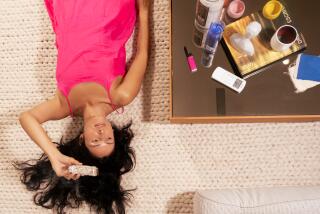Cosmetics Once Taboo, Albania Now Has Beauty Salon
- Share via
TIRANA, Albania — Drita Haxhinasto came of age while lipstick, perfume and rings were banned by the Communists as examples of bourgeois degeneracy.
She is getting her revenge. Haxhinasto owns the first beauty parlor in Tirana, the capital of Albania.
Customers can enjoy cakes and soft drinks with their haircuts, manicures, pedicures and massages. An eclectic mix of music--European rock, the Beatles, rap groups, Michael Jackson, Julio Iglesias--plays in the 30-by-18-foot salon, whose white walls and ceiling are trimmed in pink.
A sign on the big street window proclaims “Beauty Salon Artemis” in Albanian and English. Artemis may be the goddess of the hunt in Greece, but she is the goddess of beauty in Albania.
“I worked hard to convince my husband, and later the banks, of the value of this initiative, which has been my dream,” said Haxhinasto, 40, who also is a mechanical engineer and deputy head of the Women’s Forum, a support group for women.
She opened her shop Nov. 26 and was “surprised” to have more than 300 customers in the first month, Haxhinasto said. Her clients choose hairstyles by leafing through clippings from French and Italian fashion magazines.
Most are under 30, said Haxhinasto, who wears her curly hair cut short and dyes it black. She said older women seem shy about patronizing the salon, and it is unlikely to attract people from the countryside, where two-thirds of Albania’s 3.2 million people live.
The mountainous, predominantly Muslim nation is by far the poorest in Europe. Rural women are too busy collecting wood, baking bread, washing clothes and working in the fields to have much time for themselves. Most cut their own hair and use makeup only for weddings.
Such a rigorous life was suited to the Stalinist system Communist leader Enver Hoxha imposed during his 40-year rule, which ended with his death in 1985.
As was true elsewhere in the Communist world, however, those in charge had certain advantages.
Haxhinasto recalled futile attempts to look as good as some classmates who could travel abroad and visit beauty salons because their parents were party officials. In those frustrating years, she dreamed of opening such a shop.
Legal obstacles disappeared with the collapse of communism, but poverty makes a hard climate for her chosen business.
In a country with an average wage equal to about $15 a month, her prices range from 25 cents to $6. A wash, cut and balsam treatment costs about 50 cents. Hair coloring or highlighting is the most expensive.
“The prices here are reasonable,” Kozeta Mamaqi, 46, a former political prisoner, said while scanning the price list. “One lipstick costs from 60 up to 110 leks (50 cents to $1) on the black market.”
A 19-year-old high school student, Nada Gurashi, said: “I don’t mind spending all my money on my beauty.”
To switch from engineer to hair stylist, Haxhinasto trained for a month in Bari, Torino and Naples, Italy. She tested 50 young women and chose seven as her assistants, at $20 a month each. The rent is $40 a month.
To supply the shop with everything from creams to mirrors, she got a $10,000 loan from a fund set up with the help of the European Community, and an additional $4,000 from an Albanian bank. All the equipment was bought in Britain.
With the new freedom have come special expenses for new businesses in formerly Communist countries. When the old order was swept away, security and reliable basic services went with it.
Haxhinasto has bars on the windows of her shop, for fear of more riots like those in 1991, and is “obliged to pay the police station to protect it.”
She cannot yet afford a generator to protect against power failures.
More to Read
Sign up for Essential California
The most important California stories and recommendations in your inbox every morning.
You may occasionally receive promotional content from the Los Angeles Times.











